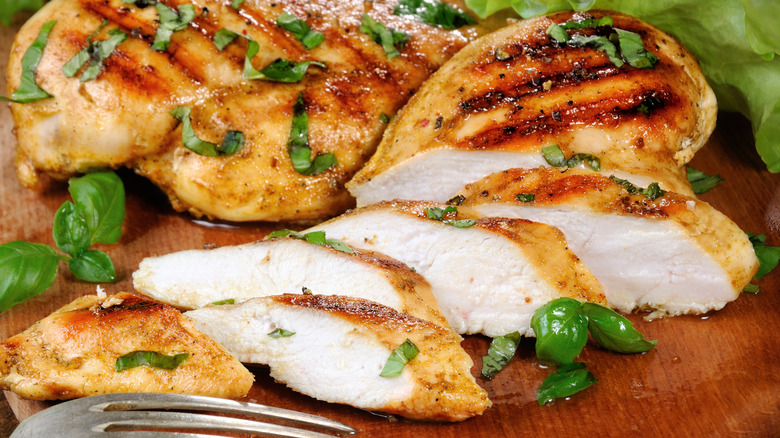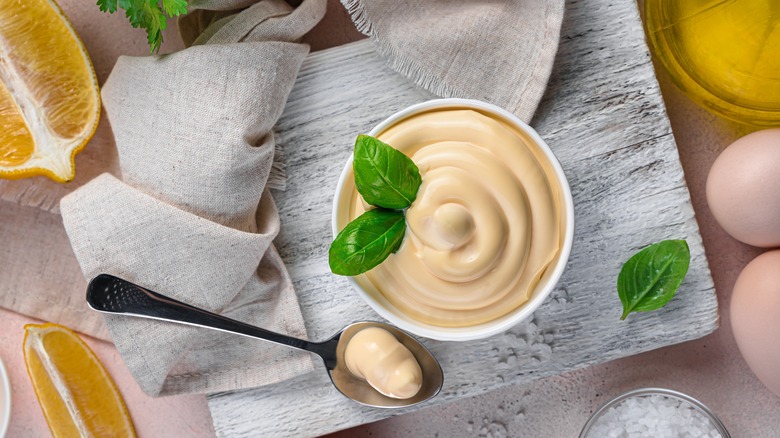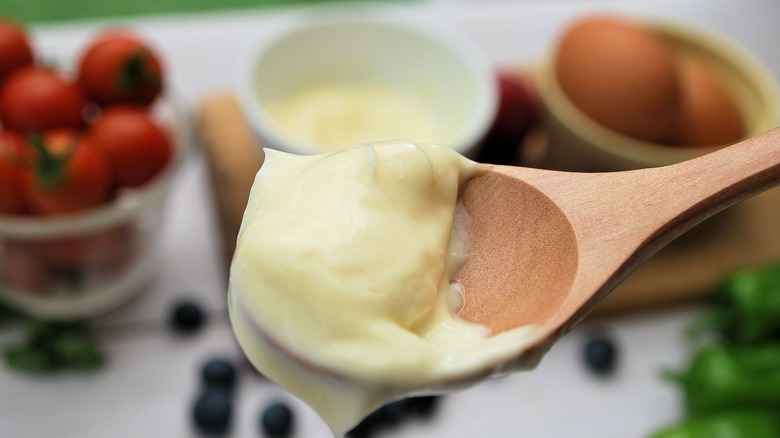Mayo Is The Secret Ingredient For Incredibly Juicy Chicken
Mayonnaise is a divisive condiment. Many sing its culinary praises, slathering it on sandwiches and mixing it into all manner of dishes. However, the other camp is quite vocal in their condemnation of the condiment. Mayonnaise hatred is rampant on the internet, from t-shirts to tweets, with more than enough opponents ready to denounce mayo's taste and pure-fat texture. Even mayo's origin story is contentious — some historians claim it was invented by the French Duke de Richelieu's chef in 1756, while others insist mayo originated in Spain.
If you can overcome an abstract abhorrence for mayonnaise — and don't mind its history remaining murky — it can become your kitchen's secret weapon. Mayonnaise is made from emulsified oil, egg, and some kind of acid, like vinegar or lemon juice, and functions as a fat, like oil or butter, for cooking purposes. This is especially true when it comes to lean chicken, which has a tendency to become dry very quickly during grilling or baking. The fat and protein in mayonnaise are perfect for locking in moisture and keeping the protein tender. Add mayo to your chicken's marinade or slather it on the cut before cooking, and you'll experience a juicy upgrade without an overwhelming mayonnaise flavor.
Fat for flavor and tenderness
In case you still need some convincing, there are a few reasons why mayo is so beneficial. Chicken is a particularly lean cut of meat without much fat of its own, which is why it can easily become tough when cooked. However, if you add a layer of mayonnaise to the chicken, the mayo leaves a very thin layer of fat and protein from the egg, which locks in the chicken's moisture without imparting its own flavor to the meat as it cooks.
This thin layer of mayo also encourages the Maillard reaction, the chemical reaction between amino acids and reducing sugars that gives browned food its delicious flavor. Since chicken cooks quickly, it can be difficult to achieve the beautiful brown sear without overcooking it, but the protein and fat from the mayo increases the browning without drying out the chicken.
Mayo isn't only effective for making juicy chicken when used on its own, though. A dollop of mayonnaise in your chicken's marinade acts as an excellent binding agent, helping it adhere to the chicken instead of sliding off in the pan. Especially thin or sugar-heavy marinades can burn easily, but the added mayo thickens the sauce and coats the sugars, preventing them from burning quickly. The acid in the mayo can also tenderize the meat while it marinates, ensuring a juicy cut every time.
Other dishes that mayo can elevate
Chicken is far from the only dish that could benefit from a dollop of mayonnaise, and there are many uses for mayo you should know about. It's not just chicken that gains moisture from mayo — mayonnaise has long been popular for its use in cakes and other baked goods. When swapped for butter, oil, or even eggs in a recipe, mayonnaise can elevate a cake's moistness to the next level.
However, moisture isn't all mayo can offer. Mayonnaise serves as an easy thickener for sauces, soups, and chowders, adding a bit of richness and creaminess without overpowering the flavor — and without introducing a flavor of its own. And speaking of creaminess, mayo is the unexpected ingredient that will elevate guacamole. The inclusion may earn some judgment from your friends (after all, the suggestion has sparked intense online debate), but mayo will give the dish a silky texture that's perfect for spreading and dipping, and will add a hint of its own tangy flavor to the mix. Once you discover the culinary wonders of this condiment, you won't hesitate to toss your "I Hate Mayonnaise" t-shirt.


